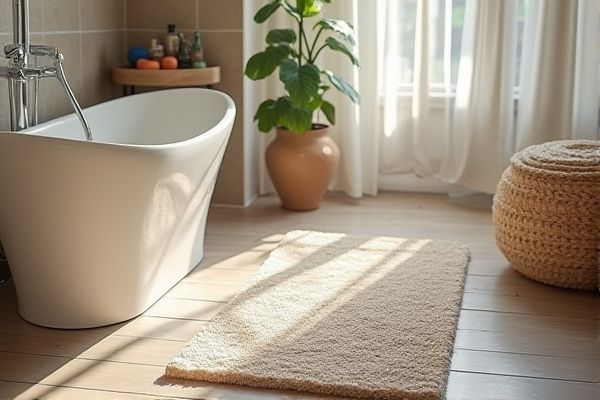
Teak mats offer natural durability and water resistance perfect for wet environments, while cotton bath rugs provide softness and absorbency for a warm, cozy feel. Discover which option best suits your bathroom needs by reading the rest of this article.
Table of Comparison
| Feature | Teak Mat | Cotton Bath Rug |
|---|---|---|
| Material | Durable teak wood | Soft, absorbent cotton fibers |
| Water Resistance | Highly water-resistant, quick-drying | Absorbs water, dries slowly |
| Durability | Long-lasting, resists rot and mold | Prone to wear and mildew over time |
| Maintenance | Easy to clean, requires occasional oiling | Machine washable, frequent washing needed |
| Comfort | Firm surface, natural warmth | Soft and plush underfoot |
| Slip Resistance | Good traction due to wood texture | Varies; often backed with non-slip material |
| Eco-friendliness | Natural, biodegradable wood | Natural fiber, biodegradable but requires water for washing |
| Typical Price Range | High-end, $50 - $150 | Affordable, $10 - $40 |
Introduction: Teak Mat vs Cotton Bath Rug
Teak mats offer durability and natural water resistance, making them ideal for wet bathroom environments, while cotton bath rugs provide softness and absorbency that enhance comfort. Teak's resistance to mold and mildew ensures long-lasting appeal, whereas cotton rugs require regular washing to maintain hygiene. Your choice depends on whether you prioritize easy maintenance and longevity or plush comfort and warmth.
Material Composition and Durability
Teak mats are crafted from dense, natural hardwood known for its water resistance and long-lasting durability, making them ideal for moisture-prone environments. Cotton bath rugs consist of soft, absorbent fibers that provide comfort but tend to wear out faster and may require frequent washing to maintain quality. Your choice depends on whether you prioritize sturdiness and water resistance or softness and ease of care.
Water Absorption and Drying Time
Teak mats exhibit low water absorption due to the natural oils in the wood, allowing them to dry quickly and resist mold and mildew buildup. Cotton bath rugs absorb significantly more water, providing a plush, absorbent surface but requiring longer drying times that can lead to mildew if not properly ventilated. For wet environments, teak mats offer superior durability and faster drying, while cotton rugs prioritize softness and absorbency.
Comfort Underfoot
Teak mats offer a firm, durable surface that is naturally water-resistant but lacks the softness typically associated with bath rugs. Cotton bath rugs provide superior comfort underfoot, featuring plush fibers that absorb moisture effectively and feel gentle on the skin. Choosing between a teak mat and a cotton bath rug depends on prioritizing either firmness and durability or softness and cozy comfort after a shower.
Maintenance and Cleaning Requirements
Teak mats require minimal maintenance due to their natural resistance to water, mold, and mildew, needing only occasional wiping with a damp cloth and periodic oiling to preserve their finish. Cotton bath rugs demand frequent washing to prevent the accumulation of dirt, bacteria, and moisture, often requiring machine washing and thorough drying to maintain hygiene. Compared to cotton, teak mats offer a more durable and low-maintenance option ideal for wet environments.
Aesthetic Appeal and Design Options
Teak mats offer a natural, warm aesthetic with rich wood grains that enhance bathroom decor, often available in sleek, minimalist designs that complement modern and rustic styles. Cotton bath rugs provide a soft, plush texture with a wide range of colors, patterns, and weaves, allowing for versatile design options that suit traditional, contemporary, or eclectic bathrooms. Both materials serve distinct design purposes, with teak mats emphasizing durability and organic looks while cotton rugs prioritize comfort and decorative flexibility.
Slip Resistance and Safety
Teak mats offer superior slip resistance due to their natural oil content and grooved surface design, making them ideal for wet bathroom environments. Cotton bath rugs, while soft and absorbent, often lack the grip needed to prevent slips unless paired with a nonslip backing or rug pad. Prioritizing teak mats enhances bathroom safety by reducing the risk of falls on slippery floors.
Environmental Impact and Sustainability
Teak mats are highly sustainable due to teak wood's natural durability and resistance to pests, requiring minimal chemical treatments and boasting a long lifespan that reduces waste. Cotton bath rugs, while biodegradable, often rely on intensive water use and pesticides during cultivation, impacting the environment negatively. Choosing a teak mat supports eco-friendly practices and durability, offering you a greener bathroom alternative.
Cost Comparison and Value
Teak mats typically come at a higher price point than cotton bath rugs due to the durability and natural resistance of teak wood to water and mold. Cotton bath rugs tend to be more affordable and offer softness and absorbency, making them a cost-effective choice for regular use. Your decision should weigh the initial cost against long-term value, as teak mats provide longevity and low maintenance, while cotton rugs may require frequent replacement.
Which Is Best for Your Bathroom?
Teak mats offer superior durability and water resistance, making them ideal for high-moisture bathrooms prone to mold and mildew. Cotton bath rugs provide softness and absorbency, enhancing comfort and warmth underfoot but may require frequent washing to prevent mildew buildup. Choosing between teak and cotton depends on whether you prioritize longevity and easy maintenance or plush comfort and absorbency in your bathroom flooring.
 homyna.com
homyna.com